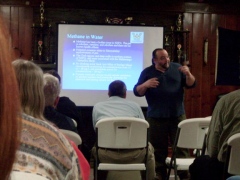Water Well Pennsylvania testing offered to residents near drilling site
http://citizensvoice.com/news/well-testing-offered-to-residents-near-drilling-site-1.738187
Well testing offered to residents near drilling site
By Elizabeth Skrapits (Staff Writer)
Published: April 21, 2010
elizabeth skrapits / the citizens’ voice Brian Oram, a hydrogeologist from Wilkes University, talks about local geology Tuesday at the Lehman Township Fire Hall.
LEHMAN TWP. – Residents near a planned natural gas well site in Lake Township were advised Tuesday to take advantage of an opportunity to have their private wells tested.
Encana Oil & Gas USA Inc., in partnership with WhitMar Exploration Co., has selected the Salansky property on Sholtis Road in Lake Township as the site of the second of three proposed exploratory natural gas wells in Luzerne County.
State regulations require natural gas drilling companies to sample drinking water wells within 1,000 feet of their drilling sites, but Encana is testing within a 1-mile radius of its proposed drilling sites.
The companies plan to start drilling at the Lake Township site in July if they can receive the required permissions, Encana Spokeswoman Wendy Wiedenbeck said. The first site to be drilled will be the Buda property behind the Ricketts Glen Hotel in Fairmount Township, in June. Although the companies have required permits to drill at a third site, the Lansberry property in Lehman Township, Wiedenbeck said she is not sure when drilling will start there.
Encana has retained Lancaster-based RETTEW Associates Inc. as a third-party firm to do the sampling, and King-of-Prussia-based TestAmerica as its independent laboratory to do the tests.
Drilling will not start until the water testing is complete, Wiedenbeck said. The reason for the water testing is to establish a baseline, or show what is in peoples’ well water before the drilling starts.
A few residents expressed concern about a similar situation like that in Dimock Township, where 14 families’ wells were invaded by methane. The state Department of Environmental Protection fined Cabot Oil & Gas Corp., made the company cap three wells, and put a stop to more drilling within a 9-square-mile radius of the township for at least a year. The problem is believed to have been caused by a faulty well casing.
Encana will follow protocols so as not to repeat the mistakes of the other well operator, according to Wiedenbeck. Differences include two well casings, the first of which will go at least 50 feet below the nearest known water source.
“I don’t know if there’s anything I can say to erase the concern from another’s mistake,” Wiedenbeck said. “We will take steps so we do not impact the water.”
On questioning, Wiedenbeck admitted Encana may have had an impact to a water source – a stream – while drilling in Colorado, but said state environmental authorities were called immediately and the company implemented a new protocol afterwards.
Although people seem to have a lot of concerns about the hydraulic fracturing process, Wiedenbeck said the biggest concern should be about the well bore instead of 7,000 feet underground: the well bore integrity will prevent fluids and gas from migrating.
If Encana did impact residents’ water, the company would be responsible to make sure they had drinkable, usable water the same as before the incident, she said.
“I think they (Encana) danced around some of the questions, but the water testing is a good idea, at least to give us a baseline,” Jeffrey Chulick, who lives near the Lake Township site, said after the meeting when asked what he thought. “I’m not sure about the natural gas drilling, though.”
After the question-and-answer session with Encana, Wilkes University hydrogeologist Brian Oram gave a presentation on what’s underground and in the water in the region.
Oram, who is not involved with the water sampling or acting as a consultant to Encana – “My role isn’t to swing somebody either way,” as he put it – did advise people to have the water sampling done.
He said in his 20 years of doing baseline water testing in Luzerne County, he found 30 percent to 50 percent of private wells were contaminated. For example, methane was discovered in wells in Tunkhannock and Columbia County even before Marcellus Shale drilling started there, Oram said.
eskrapits@citizensvoice.com, 570-821-2072

